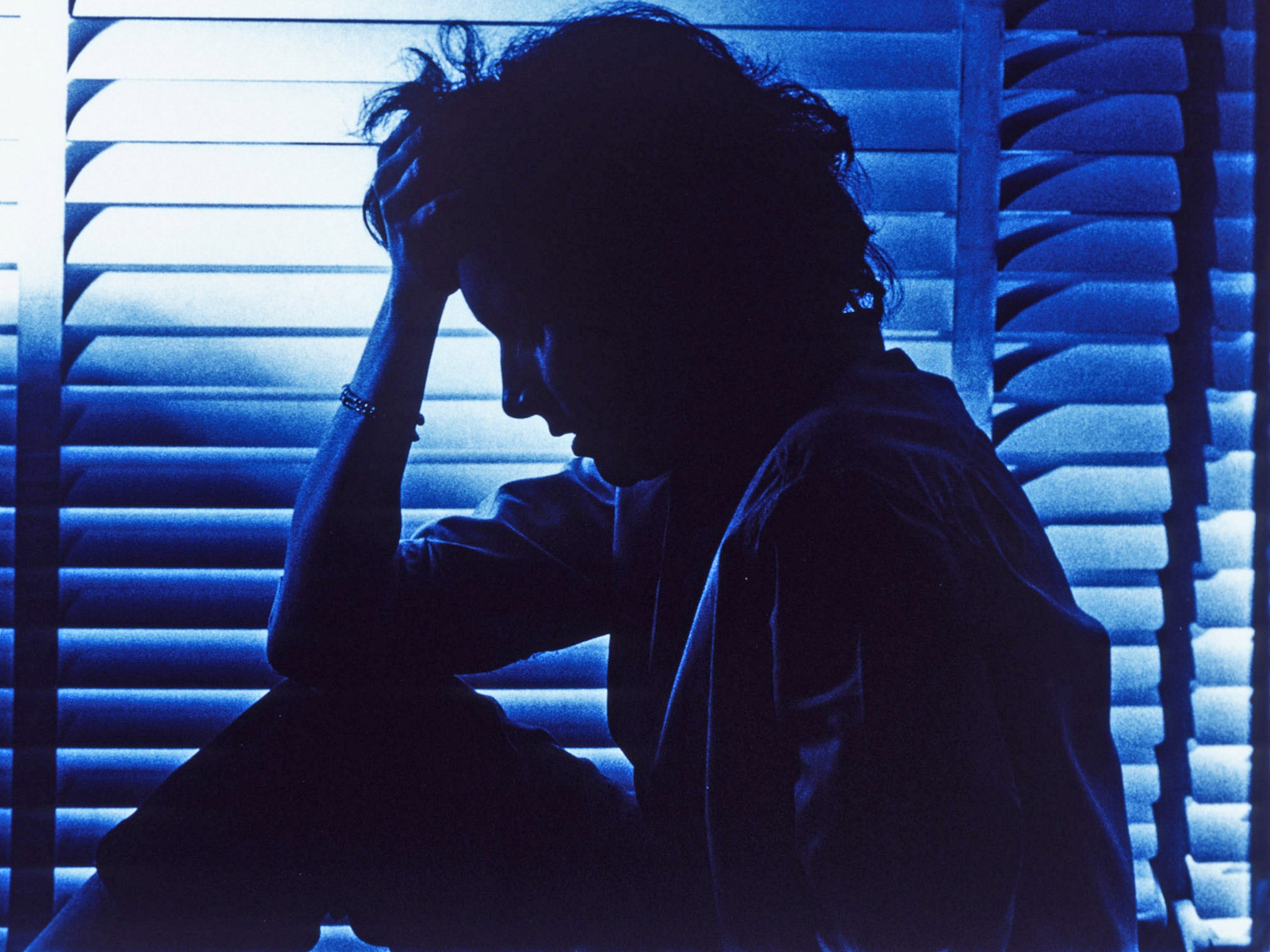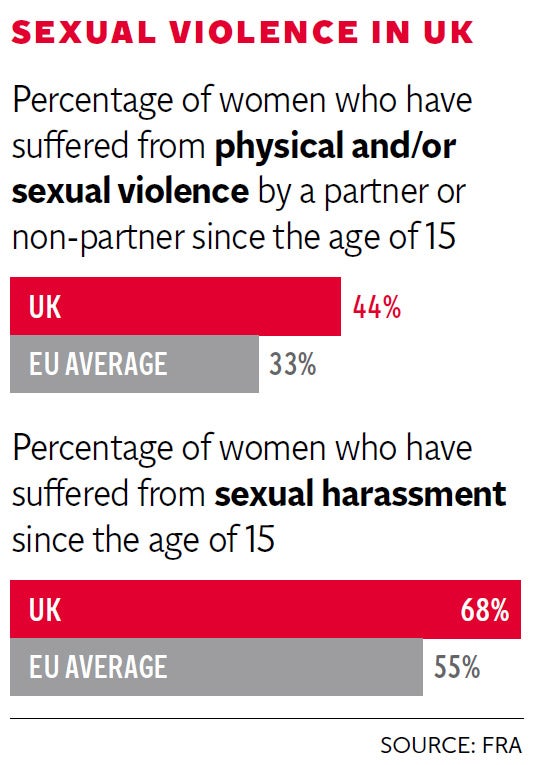The violence epidemic: Half of women in Britain admit they have been physically or sexually assaulted according to shocking new figures

Your support helps us to tell the story
From reproductive rights to climate change to Big Tech, The Independent is on the ground when the story is developing. Whether it's investigating the financials of Elon Musk's pro-Trump PAC or producing our latest documentary, 'The A Word', which shines a light on the American women fighting for reproductive rights, we know how important it is to parse out the facts from the messaging.
At such a critical moment in US history, we need reporters on the ground. Your donation allows us to keep sending journalists to speak to both sides of the story.
The Independent is trusted by Americans across the entire political spectrum. And unlike many other quality news outlets, we choose not to lock Americans out of our reporting and analysis with paywalls. We believe quality journalism should be available to everyone, paid for by those who can afford it.
Your support makes all the difference.Around one in two women in Britain have been physically or sexually assaulted, according to the world’s biggest ever report into abuse suffered by women.
The plight of women in this country is part of a far wider problem across Europe, with millions of women attacked each year – often beaten, shot, stabbed, strangled or raped.
One in three of all women in Europe - 62 million people - have been a victim of violence during their lifetime, according to the Violence Against Women report by the European Union Agency for Fundamental Rights (FRA), which is released today.
It is an “extensive but widely under-reported human rights abuse” faced by women at home, work, in public and online, warns the report.
The findings are from face to face interviews with 42,000 women in the 28 countries that make up the European Union. Participants, aged 18-74, were asked about their experiences of physical, sexual and psychological violence, as well as issues such as sexual harassment and stalking.
“Physical, sexual and psychological violence against women is an extensive human rights abuse in all EU Member States,” said FRA Director Morten Kjaerum. “Measures tackling violence against women need to be taken to a new level now,” he added.

The report also reveals that more than four in ten women [43 per cent] have experienced psychological violence from their partner – from being humiliated in public to locked indoors, forced to watch pornography, or threatened with violence.
And stalking – aided and abetted by the social media websites, texting and emails – has plagued almost one in five [18 per cent].
As well as cyberspace, the workplace is another place where women suffer. A third [32 per cent] of EU victims of sexual harassment cited a boss, colleague or customer.
Britain ranks among the worst countries in Europe when it comes to women being violently abused, coming fifth worst in terms of violence suffered by women in their lifetime (defined as being since the age of 15). The proportion of women affected, at 44 per cent, is far above the European average of 33 per cent. The only countries worse than Britain are the Netherlands, Sweden, Finland, and Denmark.
And the perpetrators, who are mostly male, are getting away unpunished due to most women not reporting crimes to the police. Only 22 per cent of British women contacted the police, similar to the European average [20].
Out of 28 countries, Britain ranks:
- Fourth worst for physical and/or sexual violence by a partner – with almost a third [29 per cent] reporting this, compared to the EU average of 22 per cent.
- Sixth worst for women avoiding places or situations for fear of being physically or sexually assaulted - two thirds [64 per cent] admit to this, a higher proportion than the EU average of just over half [53 per cent].
- Sixth worst for sexual harassment - more than two thirds [68 per cent] have suffered this, compared to the EU average of 55 per cent.
Dr Joanne Goodey, the co-author of the report, suggested that increased sexual harassment is the “flipside” of increasing equality in the workplace.
She also cited Britain’s drinking culture, with heavy drinking linked to domestic violence, as another factor in Britain faring worse than many other countries. “Also, overall violent crime rates are higher in the UK than some other parts of Europe,” she added.
Yvette Cooper, Shadow Home Secretary, said: “The Government needs to take urgent action to stop Britain languishing at the bottom of this EU-wide league table and to stop more women becoming victims of violence.”
Crime Prevention Minister Norman Baker said he would need to see the figures to ensure they were accurate. However, he said "any instance of violence is one too many".
"The Coalition Government has made significant progress in tackling violence against women and girls.
"Last year, we extended the definition of domestic violence to include controlling and coercive behaviour, introduced two new stalking offences and in December launched the 'This is Abuse' campaign to highlight that it's not just physical violence that makes a relationship abusive.
"We have also announced the roll out of Clare's Law, domestic violence protection orders and ring-fenced nearly £40 million of funding for specialist local support services and national helplines to support people in abusive situations.
"Furthermore, we have commissioned Her Majesty's Inspectorate of Constabulary (HMIC) to conduct a review into how forces deal with domestic violence and are working with the Crown Prosecution Service to ensure the law is enforced.”
But Sandra Horley CBE, chief executive of Refuge, described the EU report as “a wake-up call” whose “findings should send shockwaves through governments across Europe – including our own.”
She added: “The report also shows that Britain ranks among the worst countries in Europe when it comes to women being violently abused – a shameful accolade.”
Among the report’s recommendations are that EU countries ratify the Council of Europe’s convention on preventing and combating violence against women and domestic violence (the Istanbul Convention), draw up action plans to tackle violence against women, and ensure that police, doctors, employers and others are trained and equipped to help women victims of violence.
Ms Horley called on Prime Minister David Cameron to ratify the Istanbul Convention “without delay” and “put in place robust measures to ensure that women and children are given the most basic of all human rights – the right to live in safety".
And campaigners are also calling for psychological abuse to be outlawed in a bid to protect victims of domestic violence. “It is possible for the law to criminalise a course of conduct and move beyond physical injury,” said Laura Richards, director of stalking advice service Paladin.
Join our commenting forum
Join thought-provoking conversations, follow other Independent readers and see their replies
Comments